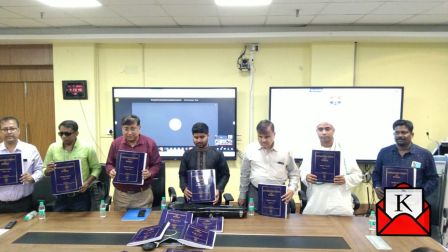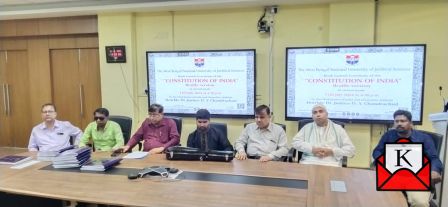The Constitution Of India Is Now Available In Braille


An elaborate ceremony was held by the West Bengal National University of Juridical Sciences (WBNUJS) to present the Indian Constitution in Braille. This momentous occasion signaled a historic shift in the legal profession’s and legal education’s ecology toward accessibility and inclusivity.
During the event, the Hon’ble Vice Chancellor of WBNUJS, Prof. Dr. Nirmal Kanti Chakrabarti, spoke to the media about the significance of providing visually impaired students and all Indian citizens with access to the Constitution.
Prof. Dr. Nirmal Kanti Chakrabarti said “We at WBNUJS are celebrating a historic event. The Braille version of the Indian Constitution will enable those with visual impairments to have direct access to the foundational legal instrument of our country. It’s a big step toward making sure that everyone can comprehend India’s legislative, executive, and judicial systems, regardless of their physical capabilities”.
The effort to produce a Braille version of the Indian Constitution is particularly noteworthy since it provides blind individuals with unmatched access to essential legal information. Accessibility not only promotes inclusion but also enhances the ability of those with visual impairments to participate actively in the legal system, advocate for their own and others’ rights, and make important contributions to society. They also thanked the principal and personnel of the Ramakrishna Mission Blind Boys’ Academy, Narendrapur, Regional Press, for their cooperation and hard effort on this occasion.
The celebration honored this historic accomplishment and demonstrated WBNUJS’s commitment to dismantling obstacles and advancing equitable access to legal services by opening the Accessibility Lab for students with visual impairments in 2020. It is anticipated that the release of the Indian Constitution in Braille will be extremely helpful to those who are blind or visually impaired, allowing them to learn about and comprehend the rules of the country. Except for law students, all such students will have access to the NUJS Library.
The project demonstrates WBNUJS’s dedication to upholding our constitutional duty to create an inclusive society. The institution is proud to have started this new chapter in legal accessibility and is eager to continue pushing for more inclusive programs in the future. It is anticipated that additional institutions would be inspired to take such actions to guarantee that legal resources and education are available to all members of society, as a result of WBNUJS’s endeavor.
Priyanka Dutta
